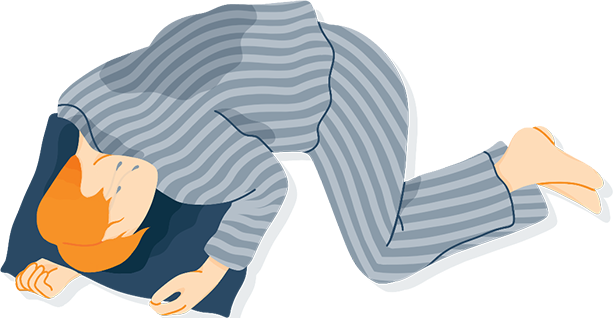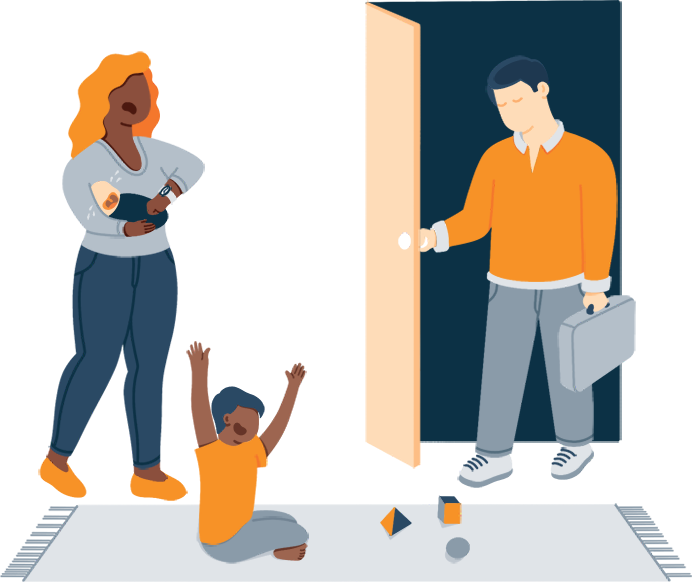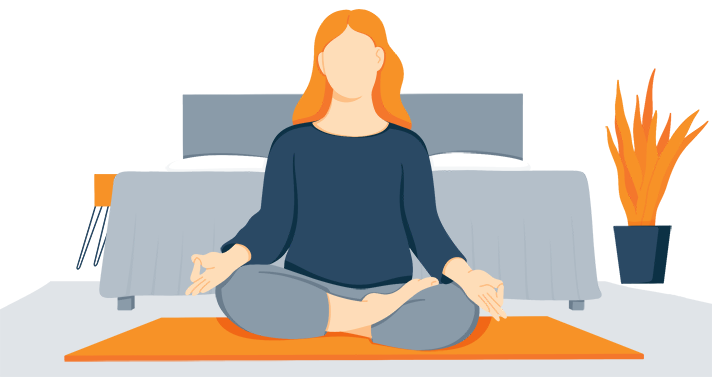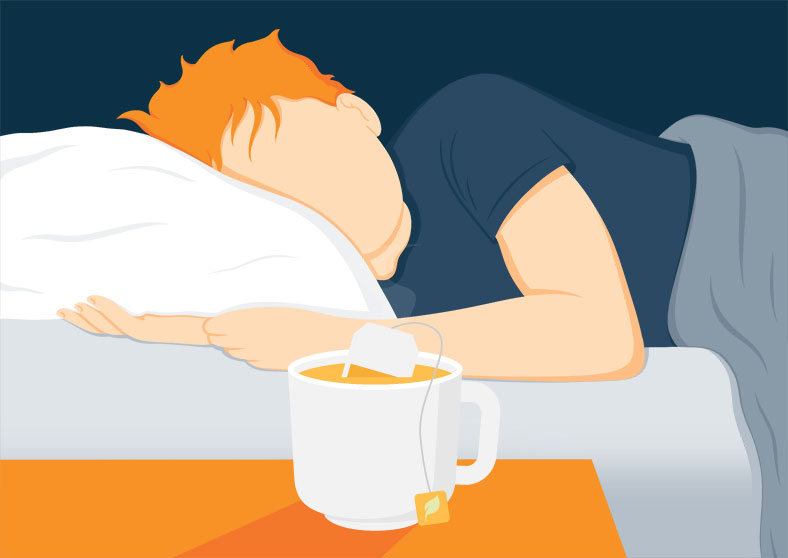This article was expert reviewed by Emma Ashford and Katherine Hall.
Sleep issues can leave many of us feeling helpless and at a loss for a quick fix. Unfortunately, waking up in the middle of the night and not being able to go back to sleep isn’t uncommon, but that doesn’t mean the occurrence is necessarily healthy or expected.
If you’re feeling confused or frustrated, we’re here to help. Below, we discuss a variety of reasons you may be waking up in the middle of the night and outline a few small steps to help you wake up feeling refreshed and ready to conquer the day.
Reasons Why We Wake up at Night
Waking up throughout the night is actually a normal part of sleep. In fact, a newer study1 shows that our brain wakes up more than 100 times throughout the night due to the stress hormone, noradrenaline. These moments of wakefulness are so minuscule, though, that the sleeper won’t notice.
Dr. Raj Dasgupta’s Answer
“People usually wake up in the middle of the night because of their natural sleep cycle, but stress, anxiety, something causing you physical discomfort, or something disturbing you in your sleeping environment can also contribute to nighttime awakenings.”
What we do notice, though, are things like waking up and going to the bathroom in the middle of the night or waking up at the same time each night. Getting up to urinate once2 during the night is common and normal, and actually, waking up at the same time each night is common as well.
Experts3 believe that waking up at the same time each night is because of where you are in your sleep cycle. If you go to sleep at around the same time each night, you’ll reach a light stage of sleep at the same time each night and be more likely to wake up. As long as you are easily able to go back to sleep and you don’t feel any impact the next day, these short night-time awakenings are normal and healthy.
The problem is when you’re unable to go back to sleep easily or at all, and you feel unrested as a result. There are several reasons for what is called “middle insomnia4.”
1. Night Terrors
Research5 shows that certain people are predisposed to night terrors because of genetics, but environmental factors also play a role. Also called “sleep terrors,” these episodes are characterized by extreme fright, panic, and a temporary incapacity to regain full consciousness. Most commonly, they affect children6, and most people grow out of them in their teenage years. However, some adults have night terrors throughout their lives.
While certain people are genetically predisposed to having them, episodes are often triggered7 by environmental factors like stress, fatigue, emotional distress, fever, or conflict.
Ensuring you and your kids get enough sleep, establishing a consistent and relaxing nighttime routine, managing stress, and not overly focusing on the sleep terror the next day should help8.
2. Sleep Apnea
Many Americans struggle with sleep apnea, which is characterized by the body ceasing to breathe at regular intervals throughout the night. Luckily, our bodies are incredibly sensitive and typically awaken to resume breathing; however, this still causes interrupted sleep.9
Many times, the awakening is so brief that we won’t remember it, but if you sleep with a partner, they may point out that you stop breathing at intervals during the night. There are devices called CPAP machines that help regulate your breathing. You may also want to switch sleeping positions and lie on your side or get a wedge pillow to help keep you propped up if you’re a back sleeper.
Read More: Signs of Sleep Apnea
3. Anxiety, Depression, & Insomnia
Anxiety and stress are normal; most people feel these emotions when life is especially tense. For people with an anxiety disorder, though, the anxiety doesn’t go away with the circumstances. Symptoms like restlessness, panic, worry, a racing heart, and more can interfere with daily life – and sleep10.
Find Out More: How Does Anxiety Affect Your Sleep?
Depression is often a precursor to sleep issues, so if you’re struggling with sleep, your mental health may be the root cause11. If you have depression, anxiety disorder, or both, it will likely impact your sleep in a cyclical way – the less you sleep, the more your mental health will be impacted; the more your mental health is impacted, the less you’ll sleep.
Even if you don’t live with an anxiety disorder or major depression, the stresses of life built up over a day, weeks, or months can make relaxing feel impossible when we finally crawl into bed. This type of prolonged stress can also trigger insomnia and profoundly affect our sleep.
If daily stressors or mental health disorders are the things keeping you up at night, the best thing you can do is limit your stressors and increase the things that bring you joy and relaxation. Also, if you are struggling, talk to a professional who can guide you.
View Our Guide: How to Cope With Stress and Sleep
4. Environmental Factors
A room that is too hot or too cold is a likely culprit in your stolen rest. The ideal temperature of your bedroom should be between 60 and 67 degrees12, which may seem cold to some, but being too warm can impair our ability to sleep as well.
When our bodies prepare for sleep, our internal temperature drops13 due to the release of the hormone melatonin. To stay asleep, humans have to maintain a temperature that’s about one or two degrees below the standard 98.6 degrees. When your bedroom thermostat is set too high or low, it causes the body to work harder to maintain that equilibrium, which can wake you up as a result.
Get More Info: Benefits of Sleeping in a Cold Room
5. Sleep Disorders
According to the CDC14, the most common sleep disorders are insomnia, narcolepsy, restless leg syndrome, and sleep apnea. All of these disorders can cause waking up in the middle of the night, but it is one of the characteristics of insomnia, in particular. In fact, it is called “middle insomnia” when you only struggle with sleep in the middle of the night, rather than in the beginning.4
6. Physical Pain
As mentioned, mental health and sleep have a cyclical relationship, but research says that physical pain and sleep also have this type of connection. Studies15 show that physical pain leads to sleep disturbances (like waking up in the middle of the night), and sleep disturbances lead to more physical pain.
People living with chronic pain16 often report issues staying asleep and waking up more frequently throughout the night than others.
7. Late Afternoon Naps
There is a right and wrong way to take a nap, especially for those who wake up in the middle of the night. Experts17 recommend naps only as long as 10 to 20 minutes and earlier in the day – before 3:00 p.m. – to avoid disrupting your sleep later that night. This is especially true for people already struggling with insomnia or waking up in the middle of the night, as you might inadvertently be training your mind18 to rely on naps.
8. Having to Urinate
Earlier, we mentioned that it’s normal to wake up once during the night to go to the bathroom, but experts say that more than that might mean something else is going on. It’s often an issue that is easy to resolve – perhaps you drank too much water or alcohol before going to bed, which can make you have to urinate more frequently throughout the night. Other causes could be a diuretic medication, UTI (for females), or just a sign of getting older.
If it persists, though, and you are under the age of 60,19 you might consider talking to your doctor, especially if it is disrupting your sleep and affecting your life.
9. Noise Disruptions
Perhaps you live in an urban area, or maybe you have roommates, children, or pets that wake you up at odd hours of the night. Depending on what stage of the sleep cycle you are in, noise disruptions can wake even the soundest of sleepers. If you want to reduce the likelihood of being woken up by noises at night, try using a white noise machine.
10. Hormone Fluctuation
For people who have menstrual cycles, this fluctuation throughout the month can cause all sorts of symptoms, including waking up in the middle of the night. This is due to the drastic drop in progesterone20 right before your period, not to mention potential stomach cramps waking you up as well.
Sleep can also be disturbed during pregnancy due to fluctuating hormones, a changing body, and physical discomfort, especially by the third trimester20.
Finally, for people going through menopause, hormonal shifts often cause waking up in the middle of the night with hot flashes or night sweats. Experts advise eating soy-rich foods to balance out estrogen levels, avoiding spicy foods to mitigate night sweats, and keeping cool with light (or no) pajamas at night22.
Tips for Getting Back to Sleep in the Middle of the Night
Deep Breathing
There are a variety of deep breathing techniques to help with stress, anxiety, and sleep. Studies have shown that deep breathing techniques in conjunction with sleep hygiene may be highly effective in initiating sleep and falling back to sleep when awoken in the middle of the night.[5]
Meditate
Meditating is a perfect way to clear the mind and help you sleep. You can access free and low-cost guided meditations through YouTube or an app, like Headspace, but remember that blue light from screens will wake you up further. In this case, you can use the meditations on your phone but be sure to turn the brightness all the way down, put your phone on “night shift” mode (if you have an iPhone), or even just listen to the meditation and cover up the screen.
Many meditation platforms offer fantastic guided sessions that facilitate relaxation, focus, deep breathing, and sleepiness— perfect for those sleepless moments in the middle of the night.
Learn: How to Meditate Before Sleep
Progressive Muscle Relaxation
This technique is often done at the end of a yoga class, and it can work wonders for sleep, as it’s known for its relaxation effects22. You can practice this by tensing (gently, not to the point of pain or cramping) and then relaxing each muscle in your body, starting with your feet and slowly moving up your entire body.
Get Out of Bed
This might seem counterintuitive, but experts in cognitive behavioral therapy for insomnia18 recommend getting up and out of bed if you still can’t get back to sleep after trying other techniques. The idea is to treat your bedroom as a place for sleep and sex only. Lying in bed trying to sleep or thinking about how you can’t sleep can create an association between not being able to sleep and your bedroom.
To break this association, studies23 show that it’s helpful to go to another room and engage in a relaxing activity until you’re sleepy again. Then, go back to the bedroom to sleep.
Tips for Staying Asleep
Establish a Bedtime Routine
Maintaining a regular bedtime schedule should also be a part of this because you’ll be training your body to feel sleepy at a specific time each night. Additionally, it’s important to consistently wake up at the same time each day to further facilitate this routine.
To maximize the time you stay asleep, creating a routine can be extremely beneficial. Maintaining a regular schedule can help signal to your body that it’s time for bed and should work to relax you enough to drift off easily.
You could incorporate simple things like reading for 10 minutes, a warm shower or bath, or a cup of herbal tea. Even the act of brushing your teeth could be a powerful signal that can train your mind to cease internal chatter and prepare for sleep. You could even finish the night with some stretching before bed.
Want to learn more? Visit our guide to relaxing bedtime rituals.
Make Your Bedroom Conducive to Sleep
If you want a helpful visual, try to make your bedroom as much like a cave as you can. Aim for pitch darkness, a colder temperature, and complete silence.
Small slivers of light may seem harmless, but even a bit of light can be disruptive and mess with your circadian rhythm, waking you up in the middle of the night. Blackout curtains can be excellent for creating a dark haven, so even if there’s light outside, your sleep won’t be disturbed.
Additionally, avoid falling asleep with the television on and keep your cell phone in another room, as blue light and noises from these devices could wake you.
Avoid Caffeine
Caffeine stays in your system long after your last cup. The exact number of hours varies, but research24 shows caffeine in healthy individuals may take up to nine and a half hours to eliminate from the body. Some individuals may take even longer depending on their bodies. For many people, this would look like trouble going to sleep in the first place, but for some, it will manifest as waking up in the middle of the night25.
If your goal is to be asleep by 10:00 p.m. and stay asleep through the night, be sure you’re not drinking coffee any later than 3:00 p.m. If you’re sensitive to caffeine or having issues with sleep, it’s best to keep it to a morning routine or avoid it altogether.
Get More Info: Caffeine and Sleep
Frequently Asked Questions
What is middle insomnia?
Waking up in the middle of the night is common and can be due to many things. It is normal for people to wake up and go to the bathroom about once per night or wake up briefly after a dream or if there is a jarring sound.
However, it becomes a problem when you regularly wake up in the middle of the night and can’t go back to sleep. This type of middle insomnia can be caused by mental health issues like depression or anxiety, stressful life situations, night terrors, hormones, physical pain, sleep disorders, poorly timed naps, or environmental factors like a room that is too hot, cold, or loud.
Unlike insomnia, which is the inability to fall asleep, middle insomnia means it’s difficult for you to sleep during the middle of the night..25 Waking up between 1:00 a.m. and 4:00 a.m. and not falling back asleep is the most common symptom of middle insomnia. However, times vary depending on the individual.
Can I take melatonin at 3:00 a.m.?
It’s not advised to take melatonin in the middle of the night, as it is not a fast-acting “sleeping pill.” Rather, melatonin is most effective when taken about two hours26 before bedtime. If you take it at 3:00 a.m., it will only start to become effective around 4:00 or 5:00 a.m.
If you want to use melatonin effectively to combat middle insomnia, try a prolonged or controlled-release melatonin supplement, anywhere from 1 to 3 milligrams two hours before your bedtime.

Rachael Gilpin
Content Writer
About Author
Rachael is a content writer for Sleep Advisor who loves combining her enthusiasm for writing and wellness.
Back Sleeper
References:
- “Stress transmitter wakes your brain more than 100 times a night — and it is perfectly normal”. University of Copenhagen. 2022.
- “Nocturia”. Cleveland Clinic. Last modified January 6, 2020.
- Das MD, Aneesa. “Why do I wake up at the same time every night?”. Ohio State University. 2018.
- Goldstein, Benjamin I., Levitt, Anthony J. “Middle-of-the-Night Insomnia”. Psychiatric Clinical Skills. 2006.
- Kales, A., et al. “Hereditary factors in sleepwalking and night terrors”. National Library of Medicine. 1980.
- “Sleep Terrors (Night Terrors)”. Mayo Clinic. Last modified April 23, 2021.
- “Nightmares and Night Terrors”. Johns Hopkins Medicine. Webpage accessed January 9, 2024.
- “Night terrors (night-time wakings)”. The Royal Children’s Hospital Melbourne. Last modified March 2018.
- “What Is Sleep Apnea?”. National Heart, Lung, and Blood Institute. Last modified March 24, 2022.
- “Anxiety Disorders”. National Institute of Mental Health. Last modified April 2022.
- Nutt, David., Wilson PhD, Sue., Paterson PhD, Louise. “Sleep disorders as core symptoms of depression”. Dialogues in Clinical Neuroscience. 2008.
- “What’s the Best Temperature for Sleep?”. Cleveland Clinic. 2021.
- Lok, Renske., et al. “Daytime melatonin and light independently affect human alertness and body temperature”. National Library of Medicine. 2019.
- “Key Sleep Disorders”. Centers for Disease Control and Prevention. Last modified December 14, 2022.
- Finan PhD, Patrick H., Goodin PhD, Burel R., Smith PhD, Michael T. “The association of sleep and pain: an update and a path forward”. The Journal of Pain. 2013.
- Tang, Nicole K.Y. “Insomnia Co-Occurring with Chronic Pain: Clinical Features, Interaction, Assessments and Possible Interventions”. British Journal of Pain. 2008.
- “Napping: Do’s and don’ts for healthy adults”. Mayo Clinic. Last modified November 9, 2022.
- “Stimulus Control and CBTI”. Stanford Medicine. Webpage accessed January 18, 2024.
- Kim, Sun-Ouck., et al. “Age related change of nocturia in women”. International Neurology Journal. 2010.
- Chen, Jennifer. “Women, Are Your Hormones Keeping You Up at Night?”. Yale Medicine. 2017.
- Jerath, Ravinder., Beveridge, Connor., Barnes, Vernon A. “Self-Regulation of Breathing as an Adjunctive Treatment of Insomnia”. Frontiers in Psychiatry. 2019.
- “Stress Management: Doing Progressive Muscle Relaxation”. University of Michigan Health. Last modified February 9, 2022.
- Rossman PhD, Jeffrey. “Cognitive-Behavioral Therapy for Insomnia: An Effective and Underutilized Treatment for Insomnia”. National Library of Medicine. 2019.
- “Pharmacology of Caffeine”. National Academy of Sciences. 2001.
- Olson MD, Eric J. “Insomnia: How Do I Stay Asleep?”. Mayo Clinic. Last modified April 23, 2019.
- Savage, R.A., et al. “Melatonin”. StatPearls. Last modified August 8, 2022.





